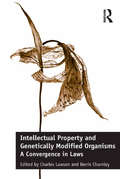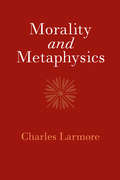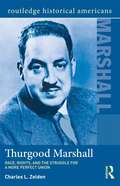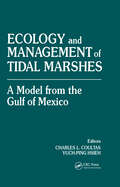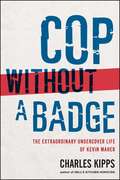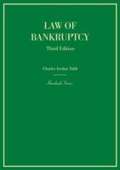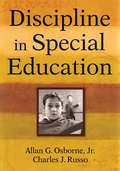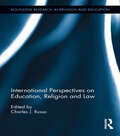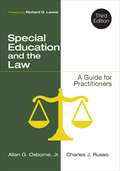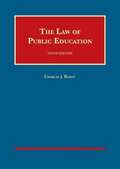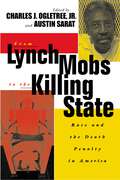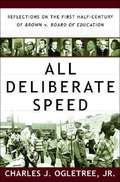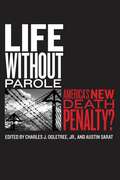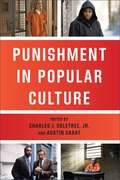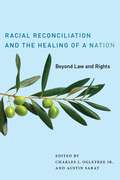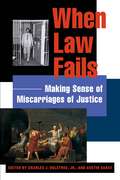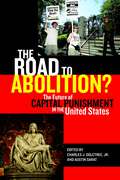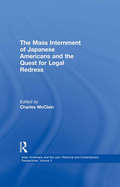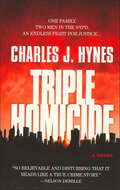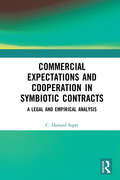- Table View
- List View
Intellectual Property and Genetically Modified Organisms: A Convergence in Laws
by Charles Lawson Berris CharnleyTaking a global viewpoint, this volume addresses issues arising from recent developments in the enduring and topical debates over Genetically Modified Organisms (GMOs) and their relationship to Intellectual Property (IP). The work examines changing responses to the growing acceptance and prevalence of GMOs. Drawing together perspectives from several of the leading international scholars in this area, the contributions seek to break away from analysis of safety and regulation and examine the diversity of ways the law and GMOs have become entangled. This collection presents the start of a much broader engagement with GMOs and law. As GMO technology becomes increasingly more complex and embedded in our lives, this volume will be a useful resource in leading further discussion and debate about GMOs in academia, in government and among those working on future policy.
Morality and Metaphysics
by Charles LarmoreIn this book, Charles Larmore develops an account of morality, freedom, and reason that rejects the naturalistic metaphysics shaping much of modern thought. Reason, Larmore argues, is responsiveness to reasons, and reasons themselves are essentially normative in character, consisting in the way that physical and psychological facts - facts about the world of nature - count in favor of possibilities of thought and action that we can take up. Moral judgments are true or false in virtue of the moral reasons there are. We need therefore a more comprehensive metaphysics that recognizes a normative dimension to reality as well. Though taking its point of departure in the analysis of moral judgment, this book branches widely into related topics such as freedom and the causal order of the world, textual interpretation, the nature of the self, self-knowledge, and the concept of duties to ourselves.
The Autonomy of Morality
by Charles LarmoreIn The Autonomy of Morality Charles Larmore challenges two ideas that have shaped the modern mind. The world, he argues, is not a realm of value-neutral fact, nor does human freedom consist in imposing principles of our own devising on an alien reality. Rather, reason consists in being responsive to reasons for thought and action that arise from the world itself. Larmore shows that the moral good has an authority that speaks for itself. Only in this light does the true basis of a liberal political order come into view, as well as the role of unexpected goods in the makeup of a life lived well.
The Day Freedom Died: The Colfax Massacre, the Supreme Court, and the Betrayal of Reconstruction
by Charles Lane"Absorbing ... Riveting ... A legal thriller. "--Kevin Boyle, The New York Times Book Review. Following the Civil War, Colfax, Louisiana, was a town like many where African Americans and whites mingled uneasily. On April 13, 1873, a small army of white ex-Confederate soldiers, enraged after attempts by freedmen to assert their new rights, killed more than sixty African Americans who had occupied a courthouse. Seeking justice for the slain, one brave U. S. attorney, James Beckwith, risked his life and career to investigate and punish the perpetrators--but they all went free. What followed was a series of courtroom dramas that culminated at the Supreme Court, where the justices' verdict compromised the victories of the Civil War and left Southern blacks at the mercy of violent whites for generations. The Day Freedom Died is a riveting historical saga that captures a gallery of characters from presidents to townspeople, and re-creates the bloody days of Reconstruction, when the often brutal struggle for equality moved from the battlefield into communities across the nation.
The Day Freedom Died: The Colfax Massacre, the Supreme Court, and the Betrayal of Reconstruction
by Charles LaneThe untold story of the massacre of a Southern town’s freedmen and a white lawyer’s battle to bring the killers to justice: “Riveting.” —The New York Times Book ReviewFollowing the Civil War, Colfax, Louisiana, was a town, like many, where African Americans and whites mingled uneasily. But on April 13, 1873, a small army of white ex–Confederate soldiers, enraged after attempts by freedmen to assert their new rights, killed more than sixty African Americans who had occupied a courthouse. With skill and tenacity, the Washington Post’s Charles Lane transforms this nearly forgotten incident into a riveting historical saga.Seeking justice for the slain, one brave US attorney, James Beckwith, risked his life and career to investigate and punish the perpetrators—but they all went free. What followed was a series of courtroom dramas that culminated at the Supreme Court, where the justices’ verdict compromised the victories of the Civil War and left Southern blacks at the mercy of violent whites for generations. The Day Freedom Died is an electrifying piece of historical detective work that captures a gallery of characters from presidents to townspeople, and re-creates the bloody days of Reconstruction, when the often-brutal struggle for equality moved from the battlefield into communities across the nation.“Thoroughly readable, carefully documented.” —Publishers Weekly (starred review)“Fascinating.” —New Orleans Times-Picayune“An electrifying piece of historical reporting.” —Tucson Citizen
Thurgood Marshall: Race, Rights, and the Struggle for a More Perfect Union
by Charles L. ZeldenThurgood Marshall was an Associate Justice of the US Supreme Court from 1967 to 1991. He was the first African American to hold that position, and was one of the most influential legal actors of his time. Before being appointed to the Supreme Court by President Lyndon Johnson, Marshall was a lawyer for the National Association for the Advancement of Colored People (NAACP), Federal Judge (1961-1965), and Solicitor General of the United States (1965-1966). Marshall won twenty-nine of thirty-two cases before the Supreme Court – most notably the landmark case of Brown v. Board of Education, which held segregated public schools unconstitutional. Marshall spent his career fighting racial segregation and legal inequality, and his time on the court establishing a record for supporting the "voiceless American." He left a legacy of change that still affects American society today. Through this concise biography, accompanied by primary sources that present Marshall in his own words, students will learn what Marshall did (and did not do) during his life, why those actions were important, and what effects his efforts had on the larger course of American history.
Ecology and Management of Tidal MarshesA Model from the Gulf of Mexico
by Charles L. CoultasThis is a major compendium of the existing knowledge of the ecology and management of tidal marshes by some of the leading experts in the field. The major theme of the book is the interconnectedness of the marsh, plants, marine organisms, soils and geology, energy and money flow, and legal and management effects on the system.Emphasis is placed throughout on the fact that nature has provided a free service that can either be maintained and enhanced by man or destroyed and forever lost. At a time of declining fisheries, this book points the way to management strategies that are needed to effect improvement.
Cop Without a Badge: The Extraordinary Undercover Life of Kevin Maher
by Charles KippsWhat's the difference between a cop and Kevin Maher? Kevin doesn't have a badge. And he doesn't play by the rules. Cop Without A Badge tracks confidential informant Kevin Maher as he helps the NYPD, the FBI, and many other law enforcement agencies solve cases that range from robbery to extortion to homicide. In the process, Kevin becomes the highest paid CI the DEA ever had. But Kevin's motives are more complicated than simply money. Having been arrested for Grand Theft Auto at the age of sixteen, his felony conviction prevents him from being what he always wanted to be: a police officer. So now he's out to prove to himself he truly is what he could've been. A cop. Even without a badge. Kevin Maher was 39 years old and living in New Jersey in 1996 when Cop Without A Badge was first published. Maher now works as a private investigator in the state of California.
The Law of Bankruptcy
by Charles Jordan TabbThis comprehensive text provides an exhaustive analysis and discussion of every aspect of bankruptcy law, including an overview of bankruptcy; invoking bankruptcy relief (with a very detailed explanation of the means test); the automatic stay; jurisdiction and procedure (including an extensive discussion of Stern v. Marshall); property of the estate; trustee's avoiding powers; payment of claims; executory contracts and unexpired leases; exemptions (with comprehensive analysis of Schwab v. Reilly); discharge; reorganization under Chapter 11 (including in-depth discussions of the General Motors and Chrysler cases, as well as RadLAX); debt adjustments under Chapter 13 (including the Lanning and Ransom cases); and debt adjustments under Chapter 12. The 2005 BAPCPA amendments and the extensive case law thereunder are explained and critiqued.
The End of Privacy: The Attack on Personal Rights—at Home, at Work, On-Line, and in Court
by Charles J. SykesAs Justice Louis Brandeis suggested more than a century ago, privacy--the right to be left alone--is the most valued, if not the most celebrated, right enjoyed by Americans. But in the face of computer, video, and audio technology, aggressive and sophisticated marketing databases, state and federal "wars" against crime and terrorism, new laws governing personal behavior, and an increasingly intrusive media, all of us find our personal space and freedom under attack.In The End of Privacy, Charles Sykes traces the roots of privacy in our nation's founding and Constitution, and reveals its inexorable erosion in our time. From our homes and offices to the presidency, Sykes defines what we have lost, citing example after example of citizens who have had their conversations monitored, movements surveilled, medical and financial records accessed, sexual preferences revealed, homes invaded, possessions confiscated, and even lives threatened--all in the name of some alleged higher social or governmental good. Sykes concludes by suggesting steps by which we might begin to recover the territory we've lost: our fundamental right to our own lives.
Discipline in Special Education
by Allan G. Osborne Charles J. RussoExperts provide educators with legal guidelines for taking appropriate disciplinary action that can withstand legal challenges without violating the rights of students with disabilities under IDEA 2004.
International Perspectives on Education, Religion and Law (Routledge Research in Religion and Education)
by Charles J. RussoThis volume examines the legal status of religion in education, both public and non-public, in the United States and seven other nations. It will stimulate further interest, research, and debate on comparative analyses on the role of religion in schools at a time when the place of religion is of vital interest in most parts of the world. This interdisciplinary volume includes chapters by leading academicians and is designed to serve as a resource for researchers and educational practitioners, providing readers with an enhanced awareness of strategies for addressing the role of religion in rapidly diversifying educational settings. There is currently a paucity of books devoted solely to the topic written for interdisciplinary and international audiences involving educators and lawyers, and this book will clarify the legal complexities and technical language among the law, education, and religion.
Special Education and the Law: A Guide for Practitioners (Third Edition)
by Allan G. Osborne Charles J. RussoThis essential guide translates legalese into your language and allows the special education teacher to focus on your core competency: providing excellent education for students with special needs.
The Law of Public Education
by Charles J. RussoThe Tenth Edition of this textbook-casebook incorporates recent developments in K-12 Education Law into its conceptual framework by offering updated analysis of major topics in the field. The Tenth Edition added more than 500 case citations since 2014 along with substantive discussions of many of these suits. In addition, the book includes five new case excerpts of opinions on cutting edge issues addressing state aid to faith-based educational institutions in Chapter 2; whether communications by school board members via e-mail messages violate a state’s open meetings law in Chapter 4; the extent to which school boards may promote ballot initiatives in Chapter 4; transfer rules impacting student-athletes in interscholastic sports in Chapter 12; and the level of services school boards must provide students with disabilities in Chapter 15. Citations continue to include references to West’s Education Law Reporter, thereby making it easier for instructors, students, practitioners, and other readers to locate cases and materials.
From Lynch Mobs to the Killing State: Race and the Death Penalty in America (The Charles Hamilton Houston Institute Series on Race and Justice #6)
by Charles J. Ogletree, Jr., and Austin SaratSituates the linkage between race and the death penalty in the history of the U.S.Since 1976, over forty percent of prisoners executed in American jails have been African American or Hispanic. This trend shows little evidence of diminishing, and follows a larger pattern of the violent criminalization of African American populations that has marked the country's history of punishment.In a bold attempt to tackle the looming question of how and why the connection between race and the death penalty has been so strong throughout American history, Ogletree and Sarat headline an interdisciplinary cast of experts in reflecting on this disturbing issue. Insightful original essays approach the topic from legal, historical, cultural, and social science perspectives to show the ways that the death penalty is racialized, the places in the death penalty process where race makes a difference, and the ways that meanings of race in the United States are constructed in and through our practices of capital punishment.From Lynch Mobs to the Killing State not only uncovers the ways that race influences capital punishment, but also attempts to situate the linkage between race and the death penalty in the history of this country, in particular the history of lynching. In its probing examination of how and why the connection between race and the death penalty has been so strong throughout American history, this book forces us to consider how the death penalty gives meaning to race as well as why the racialization of the death penalty is uniquely American.
All Deliberate Speed: Reflections on the First Half Century of Brown V. Board of Education
by Charles J. Ogletree Jr.Legal cases and actions since Brown.
Life without Parole: America's New Death Penalty? (The Charles Hamilton Houston Institute Series on Race and Justice #1)
by Charles J. Ogletree Jr. Austin SaratIs life without parole the perfect compromise to the death penalty? Or is it as ethically fraught as capital punishment? This comprehensive, interdisciplinary anthology treats life without parole as “the new death penalty.” Editors Charles J. Ogletree, Jr. and Austin Sarat bring together original work by prominent scholars in an effort to better understand the growth of life without parole and its social, cultural, political, and legal meanings. What justifies the turn to life imprisonment? How should we understand the fact that this penalty is used disproportionately against racial minorities? What are the most promising avenues for limiting, reforming, or eliminating life without parole sentences in the United States? Contributors explore the structure of life without parole sentences and the impact they have on prisoners, where the penalty fits in modern theories of punishment, and prospects for (as well as challenges to) reform.
Punishment in Popular Culture (The Charles Hamilton Houston Institute Series on Race and Justice #4)
by Charles J. Ogletree Jr. Austin SaratThe way a society punishes demonstrates its commitment to standards of judgment and justice, its distinctive views of blame and responsibility, and its particular way of responding to evil. Punishment in Popular Culture examines the cultural presuppositions that undergird America’s distinctive approach to punishment and analyzes punishment as a set of images, a spectacle of condemnation. It recognizes that the semiotics of punishment is all around us, not just in the architecture of the prison, or the speech made by a judge as she sends someone to the penal colony, but in both “high” and “popular” culture iconography, in novels, television, and film. This book brings together distinguished scholars of punishment and experts in media studies in an unusual juxtaposition of disciplines and perspectives.Americans continue to lock up more people for longer periods of time than most other nations, to use the death penalty, and to racialize punishment in remarkable ways. How are these facts of American penal life reflected in the portraits of punishment that Americans regularly encounter on television and in film? What are the conventions of genre which help to familiarize those portraits and connect them to broader political and cultural themes? Do television and film help to undermine punishment's moral claims? And how are developments in the boarder political economy reflected in the ways punishment appears in mass culture? Finally, how are images of punishment received by their audiences? It is to these questions that Punishment in Popular Culture is addressed.
Racial Reconciliation and the Healing of a Nation: Beyond Law and Rights (The Charles Hamilton Houston Institute Series on Race and Justice #2)
by Charles J. Ogletree Jr. Austin SaratThe work at hand for bridging the racial divide in the United States From Baltimore and Ferguson to Flint and Charleston, the dream of a post-racial era in America has run up against the continuing reality of racial antagonism. Current debates about affirmative action, multiculturalism, and racial hate speech reveal persistent uncertainty and ambivalence about the place and meaning of race – and especially the black/white divide – in American culture. They also suggest that the work of racial reconciliation remains incomplete. Racial Reconciliation and the Healing of a Nation seeks to assess where we are in that work, examining sources of continuing racial antagonism among blacks and whites. It also highlights strategies that promise to promote racial reconciliation in the future. Rather than revisit arguments about the importance of integration, assimilation, and reparations, the contributors explore previously unconsidered perspectives on reconciliation between blacks and whites. Chapters connect identity politics, the rhetoric of race and difference, the work of institutions and actors in those institutions, and structural inequities in the lives of blacks and whites to our thinking about tolerance and respect. Going beyond an assessment of the capacity of law to facilitate racial reconciliation, Racial Reconciliation and the Healing of a Nation challenges readers to examine social, political, cultural, and psychological issues that fuel racial antagonism, as well as the factors that might facilitate racial reconciliation.
When Law Fails: Making Sense of Miscarriages of Justice (The Charles Hamilton Houston Institute Series on Race and Justice #3)
by Charles J. Ogletree Jr. Austin SaratSince 1989, there have been over 200 post-conviction DNA exonerations in the United States. On the surface, the release of innocent people from prison could be seen as a victory for the criminal justice system: the wrong person went to jail, but the mistake was fixed and the accused set free. A closer look at miscarriages of justice, however, reveals that such errors are not aberrations but deeply revealing, common features of our legal system.The ten original essays in When Law Fails view wrongful convictions not as random mistakes but as organic outcomes of a misshaped larger system that is rife with faulty eyewitness identifications, false confessions, biased juries, and racial discrimination. Distinguished legal thinkers Charles J. Ogletree, Jr., and Austin Sarat have assembled a stellar group of contributors who try to make sense of justice gone wrong and to answer urgent questions. Are miscarriages of justice systemic or symptomatic, or are they mostly idiosyncratic? What are the broader implications of justice gone awry for the ways we think about law? Are there ways of reconceptualizing legal missteps that are particularly useful or illuminating? These instructive essays both address the questions and point the way toward further discussion.When Law Fails reveals the dramatic consequences as well as the daily realities of breakdowns in the law’s ability to deliver justice swiftly and fairly, and calls on us to look beyond headline-grabbing exonerations to see how failure is embedded in the legal system itself. Once we are able to recognize miscarriages of justice we will be able to begin to fix our broken legal system.Contributors: Douglas A. Berman, Markus D. Dubber, Mary L. Dudziak, Patricia Ewick, Daniel Givelber, Linda Ross Meyer, Charles J. Ogletree, Jr., Austin Sarat, Jonathan Simon, and Robert Weisberg.
The Road to Abolition?: The Future of Capital Punishment in the United States (The Charles Hamilton Houston Institute Series on Race and Justice #5)
by Austin Sarat Charles J. Ogletree JrAt the start of the twenty-first century, America is in the midst of a profound national reconsideration of the death penalty. There has been a dramatic decline in the number of people being sentenced to death as well as executed, exonerations have become common, and the number of states abolishing the death penalty is on the rise. The essays featured in The Road to Abolition? track this shift in attitudes toward capital punishment, and consider whether or not the death penalty will ever be abolished in America.The interdisciplinary group of experts gathered by Charles J. Ogletree Jr., and Austin Sarat ask and attempt to answer the hard questions that need to be addressed if the death penalty is to be abolished. Will the death penalty end only to be replaced with life in prison without parole? Will life without the possibility of parole become, in essence, the new death penalty? For abolitionists, might that be a pyrrhic victory? The contributors discuss how the death penalty might be abolished, with particular emphasis on the current debate over lethal injection as a case study on why and how the elimination of certain forms of execution might provide a model for the larger abolition of the death penalty.
The Mass Internment of Japanese Americans and the Quest for Legal Redress (Asian Americans and the Law: Historical and Contemporary Perspectives #3)
by Charles J. McClain"First Published in 1994, Routledge is an imprint of Taylor & Francis, an informa company."
Triple Homicide: A Novel
by Charles J. HynesThe debut novel from longtime Brooklyn district attorney Charles "Joe" Hynes, Triple Homicide is the gritty saga of two generations of New York City police officers fighting to stay on the right side of the law.In the early 1990s in New York, easy money stands to be made at every turn, and temptation proves a bitter struggle for the young and much-decorated NYPD Sergeant Steven Holt---and for Steven and his uncle Robert, an officer before him, an increasingly violent mess endangers their careers and the reputation of the entire department.Born out of real stories of corruption and centered around two men who ultimately dare to challenge the fabled "blue wall" of silence, the novel works toward a majestic courtroom on Long Island, where Sergeant Holt is about to stand trial for triple homicide and where, as he comes to know his past, he'll learn that nothing he's known has ever been as it seemed.In its intense telling by one of the only writers who could write it with such realism, the story uncovers decades of deceit and corruption that infiltrate families and threaten to ruin the force. Reflecting the proud yet troubled history of the NYPD, Charles Hynes's debut is a searing, up-close portrait of the men and women who live---and die---in the pursuit of criminal justice.
Still Winning: Why America Went All In on Donald Trump-And Why We Must Do It Again
by Charles HurtLearn why President Trump is the ideal changemaker that can put an end to America's uncontrollable and corrupt system of government ruled by special interest.Still Winning is the story of the unlikeliest of heroes who emerged from the unlikeliest of places to take up the impossible cause of a truly forgotten people. They are people who love their country, trust their higher God, obey laws and will do anything for their family and neighbors. They are the very people the Founders envisioned when they hatched the radical idea of self-governance. This is the story of a Leviathan government - the most powerful political force in the history of mankind - that has become dangerously unmoored from the people it represents. It is the story of how elites and the politically comfortable controlling both parties in Washington have utterly lost touch. They don't even realize how much the people they represent despise the uncontrollable Leviathan.The establishment has tried their best to ignore Donald Trump-except to brand him as a racist, a xenophobe, an isolationist, and a dangerous, violence-inciting war monger. All standards of reporting vanished. In the era of Trump, no sort of criticism was off-limits. They openly mocked his looks, ridiculed his private business accomplishments, pilloried his family and children and made fun of his foreign-born wife for her accent!The Leviathan has grown untamable. Democrats and Republicans run for office year after year on promises they have no intention of keeping. Neither side wants to fix a single problem. The whole thing has become one giant ungovernable, corrupt Ponzi scheme that - one day - will come crashing down.Charles Hurt advocates for the "Nuclear Option" for dealing with this mess: just blow the whole damned thing up. Whatever is presidential or diplomatic, let's try the opposite. Whatever these people in Washington find most horrifying, let's try that. Finally, the multi-headed Leviathan swamp monster has met the perfect dragon slayer in Donald Trump. Still Winning examines each corrupt head of this Leviathan, and why Donald Trump is the only good answer to fixing it.
Commercial Expectations and Cooperation in Symbiotic Contracts: A Legal and Empirical Analysis
by Charles Haward SoperExploring the role played by cooperation in the law and management of modern, complex contracts, this book contrasts an in-depth review of case law with a large-scale empirical study of the views of commercial actors responsible for the outcomes of these contracts. The possibility of aligning these expectations with the law is considered from the perspective that there is a general duty for parties to cooperate and ensure constructive engagement. The book examines how this might translate into constructive communication, professional governance, genuine attempts to settle issues, a right to fix defects and a duty to take decisions in a fair and rational manner. It argues that statutory adjudication should be extended to all commercial contracts and more ambitious use of available remedies, including those for prevention and cost penalties, would help provide incentives for parties to cooperate more fully. The book will be of interest to academics in the fields of contract law and of contract management, as well as legal and commercial practitioners.
